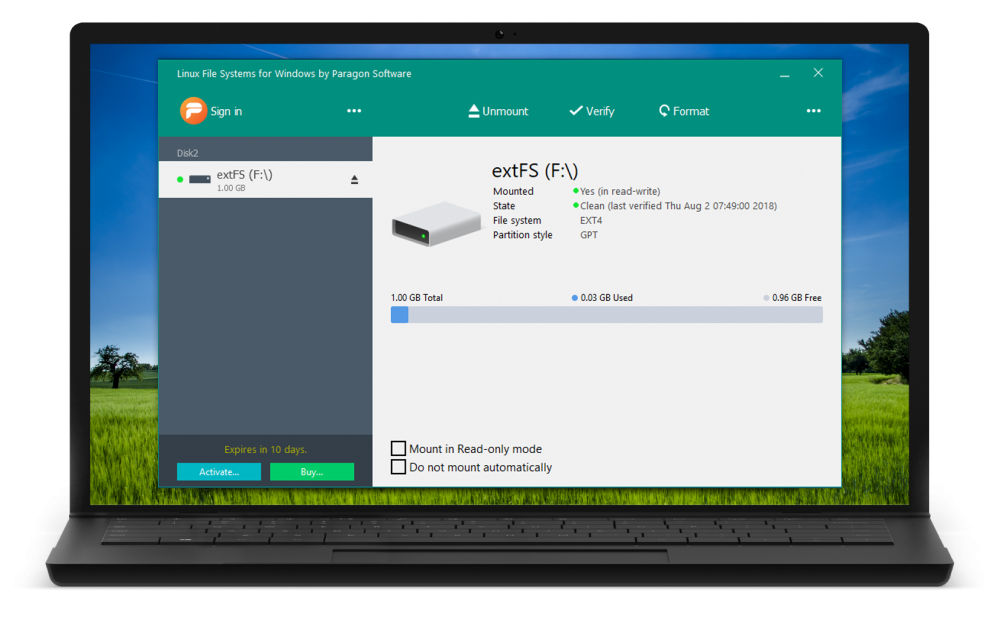

- #Extfs startup how to#
- #Extfs startup full#
- #Extfs startup series#
- #Extfs startup windows#
NTFS was designed with lots of features like Hard Links, Alternate Data Stream, File Compression, Encryption, Volume Shadow Copy, and so on. When comprising NTFS vs Ext4, you may find there are many differences between them. The maximum individual file size that the NTFS file system can support is up to 16EB, and the maximum volume size of NTFS is 16TB when using the default cluster size of 4KB. NTFS can support a maximum cluster size of 2MB. This file system comes with many new features over its predecessors, including sparse file support, reparse points, and file-level encryption, which optimizes hard disk in terms of performance, extensibility, and security. It is generally suitable for system drives and most internal hard drives.
#Extfs startup windows#
As a proprietary journaling file system, NTFS is the most widely used file system in the Windows NT family. NTFS refers to New Technology File System developed by Microsoft and introduced in 1993 with Windows NT 3.1.
#Extfs startup full#
Linux, Xbox One, Xbox 360, Windows (read and write with ext2fsd), FreeBSD (version 12.0 and later), macOS (read-only with ext4fuse and full with ExtFS), and KolibriOS (read-only)Įxt4 file system is an ideal choice for flash-based storage devices like SD cards and USB flash drives with an extremely large capacity.
Delayed allocation feature could trigger potential data loss.  Not supported by Windows and Macs natively. Doesn’t support the “secure deletion” file attribute. Boasts delayed allocation, journal checksums, pre-allocation, and some advanced features. Allows an unlimited number of subdirectories. Good performance when dealing with large files. Support for extremely large file sizes and drives. Here we summarize its pros, cons, compatibility, and applicability as follows: It is a complete journaling file system that doesn’t need to run any defragmentation utilities on disk, while NTFS and HFS+ file system need. In a word, Ext4 is one of the greatest Linux file systems that are not natively supported by Windows and macOS. Besides, it uses journaling checksums for a drive to improve reliability. This is because the unallocated blocks of data and sections of the inode table are marked as such, which enables e2fsck to skip them while checking file system. For example, its Delayed allocation technology makes sure data can be flushed to disk timely, which improves performance when dealing with large files and reduces disk fragmentation.Ĭompared with NTFS, Ext4 greatly reduces the time that will take to check file system. So, the Ext4 file system is an ideal choice for those who hold an extremely large storage device.Įxt4 comes with many new advanced features such as Extents, persistent pre-allocation, delayed allocation, journal checksums, and so on. Besides, it has no limit to the number of subdirectories in a single directory. It can support volume size up to 1EB and single file size up to 16TB with the standard 4K block size. This file system makes great progress in storage size. At present, it has become the mainstream file system for most Linux distributions. The stable version of Ext4 was officially released in 2008.
Not supported by Windows and Macs natively. Doesn’t support the “secure deletion” file attribute. Boasts delayed allocation, journal checksums, pre-allocation, and some advanced features. Allows an unlimited number of subdirectories. Good performance when dealing with large files. Support for extremely large file sizes and drives. Here we summarize its pros, cons, compatibility, and applicability as follows: It is a complete journaling file system that doesn’t need to run any defragmentation utilities on disk, while NTFS and HFS+ file system need. In a word, Ext4 is one of the greatest Linux file systems that are not natively supported by Windows and macOS. Besides, it uses journaling checksums for a drive to improve reliability. This is because the unallocated blocks of data and sections of the inode table are marked as such, which enables e2fsck to skip them while checking file system. For example, its Delayed allocation technology makes sure data can be flushed to disk timely, which improves performance when dealing with large files and reduces disk fragmentation.Ĭompared with NTFS, Ext4 greatly reduces the time that will take to check file system. So, the Ext4 file system is an ideal choice for those who hold an extremely large storage device.Įxt4 comes with many new advanced features such as Extents, persistent pre-allocation, delayed allocation, journal checksums, and so on. Besides, it has no limit to the number of subdirectories in a single directory. It can support volume size up to 1EB and single file size up to 16TB with the standard 4K block size. This file system makes great progress in storage size. At present, it has become the mainstream file system for most Linux distributions. The stable version of Ext4 was officially released in 2008. #Extfs startup series#
Top recommendation: Ext2 vs Ext3 vs Ext4 File System: Which One Should You Use? Ext4Įxt4 is the fourth extended file system as well as a journaling file system that was a series of backward-compatible extensions to Ext3. Now, we will discuss NTFS vs Ext4 vs HFS+ in detail. These file systems have their pros, cons, compatibility, and applicability.
#Extfs startup how to#
Bonus: How to Format Your Drive to Ext4/NTFS on WindowsĮxt4, NTFS, and HFS+ are common file systems used by a computer to store information on a hard drive. 
If you are also trying to figure it out, then this post of MiniTool Partition Wizard is what you need. What’s the difference between Ext4 vs NTFS vs HFS+ file systems? A lot of people are not clear which file system should be used for their hard drive.







 0 kommentar(er)
0 kommentar(er)
